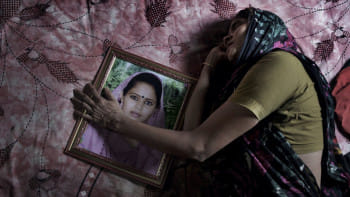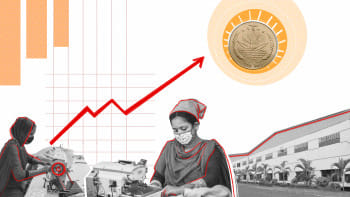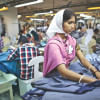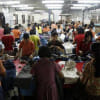Bangladesh’s ever-neglected working class

The basis of May Day, which is observed worldwide on May 1 to commemorate the historic struggles and gains of workers, are demands for fair wages against eight working hours and for a safe working environment. But even after half a century of independence, most of the working people in Bangladesh are far from enjoying these rights.
The trajectory of the country's economic growth has been such that most working people are employed in the informal sector. According to the Bangladesh Bureau of Statistics' (BBS) Labour Force Survey 2022, 84.9 percent of employed people are working in the informal sector, where there is no guarantee of labour rights including minimum wage, fixed working hours, paid leave, health insurance, etc. Even the holiday of May Day cannot be enjoyed by most workers in the informal sector.
The latest addition to the unprotected workforce are gig economy workers who have no fixed wage or salary. Nearly one lakh people in the country are providing online freelancing, outsourcing, ride-sharing, and delivery services while lacking a fixed income, job security, and any insurance against work-related injuries.
Even though workers are being killed regularly in horrific industrial accidents due to the negligence of factory owners, the government seems uninterested in punishing them. It is a sad reality that, over the last two decades, there has been no precedent of factory owners being punished in any of the incidents of workers dying due to owners' negligence—not even after the Rana Plaza collapse or Tazreen Fashions factory fire
Then again, many formal sector workers also do not have any job security and can be fired without notice. Due to the new prevalence of outsourcing and contractual employment, even the formal sector is being informalised in certain ways. Moreover, there are various obstacles in the way of workers unionising and so most are unorganised.
Meanwhile, there is no national minimum wage. And though minimum wages are fixed in 42 sectors, the amounts are also very low compared to the cost of living. According to data from the Minimum Wage Board, minimum wages in 11 sectors, including hotels and restaurants, iron foundries and engineering workshops, ayurvedic medicine factories, match factories, tea gardens, and tailoring workshops, are less than Tk 5,000. Meanwhile, the minimum wages in salt crushing, cold storage, soap and cosmetics, cotton textile, bakeries and confectioneries, automobile workshops, and shrimp processing are between Tk 5,000 and Tk 7,000.
Even the recently fixed Tk 12,500 minimum wage for workers in the ready-made garment sector, Bangladesh's largest export sector, is half of what the workers demanded and not enough to allow workers a life above the poverty line. Specifically, the daily calorie requirement for a healthy worker living above the poverty line is at least 2,200 kcal, but with the recently announced minimum wage, it will not be possible for RMG workers to live above the poverty line because a family of four needs at least Tk 23,000 for food alone each month.
Plus, many factory owners don't actually pay workers the fixed minimum wage. According to a report by The Daily Star, many sawmill workers are paid between Tk 5,000 and Tk 12,000 a month, far below the minimum of Tk 17,900 set by the government.
In a 2022 study, the Centre for Policy Dialogue (CPD) measured the minimum wages of workers from 21 industrial and service sectors against the minimum food cost of a family of four living in the centre of Dhaka, and found that, in 15 sectors, the minimum wage is not enough to cover the food cost even if the family's diet is compromised. It's no wonder that BBS' Food Security Statistics 2023 showed that 21.23 percent of the country's working population is suffering from moderate or severe food insecurity.
Due to extremely low wages, workers' families are forced to also send their children to work. According to National Child Labour Survey 2022, around 17.8 lakh children are trapped in child labour in Bangladesh, and of them, 10.7 lakh are engaged in hazardous work.
Meanwhile, workers' deaths due to unsafe working conditions is too common a phenomenon. There is no institutional arrangement to ensure the safety of workers in many sectors such as transport, construction, agriculture, day labourers, steel, ship breaking, stone breaking, etc. According to a report by Bangladesh Occupational Safety, Health, and Environment (OSHE) Foundation, at least 9,263 people have been killed in the workplace between 2013 and 2023. The number of deaths was 1,432 in 2023 alone, of which 1,103 were in the informal economy while 329 were in the formal sector. The highest number of workplace deaths last year, 637, was reported in the transport sector, while the day labourers' sector, construction sector, agricultural sector, and manufacturing sector witnessed 220, 149, 146, and 94 deaths, respectively.
Apart from accidents at work, many workers die every year and suffer from ill health chronically due to an unhealthy working environment in brick kilns, saw mills, steel factories, ship breaking yards, chemical and plastic factories, leather sector, stone quarries, etc. For example, many stone crushers contract silicosis, a long-term lung disease, due to breathing in tiny bits of silica found in sand, quartz, and many types of rocks. As per one estimate, over the past decade, about 65 workers died due to silicosis while 200 have been affected in the Burimari land port area alone.
Even though workers are being killed regularly in horrific industrial accidents due to the negligence of factory owners, the government seems uninterested in punishing them. It is a sad reality that, over the last two decades, there has been no precedent of factory owners being punished in any of the incidents of workers dying due to owners' negligence—not even after the Rana Plaza collapse or Tazreen Fashions factory fire, the devastation of which reverberated globally.
The meagre amount of compensation stipulated in the Bangladesh Labour Act, 2006 (amended in 2018) for accidental death and disability proves how little a worker's life is valued by the ruling elite. According to the law, if a worker dies in a workplace accident, his family will get a lump sum compensation of only Tk 2 lakh, and in case of permanent disability the compensation will be Tk 2.5 lakh. But even this small amount of compensation does not reach the family of injured or killed workers in many cases. According to a study by Bangladesh Legal Aid and Services Trust (BLAST), based on the analysis of 80 compensation cases filed under the BLA between 2008 and 2019 at different labour courts, the court awarded compensation in 35 of the 80 cases—of which compensation was successfully recovered in only 19 cases. The average time taken for the court to order an award of compensation from the date of application was found to be 630 days, despite the statutorily prescribed time limit of 60 days. According to a report by Prothom Alo, as many as 21,617 lawsuits were pending in the labour courts as of November 2023. Of these, some 16,141 cases have been pending for more than six months.
As living wages and safe workplaces are not ensured for the workers of Bangladesh, every year an increasing number of Bangladeshi youths desperately migrate abroad, at times risking their lives across seas, jungles, and deserts. So, as long as quality employment, living wages, and a safe working environment remain absent within the country, sustainable development will remain an illusion.
Kallol Mustafa is an engineer and writer who focuses on power, energy, environment and development economics. He can be reached at [email protected]
Views expressed in this article are the author's own.
Follow The Daily Star Opinion on Facebook for the latest opinions, commentaries and analyses by experts and professionals. To contribute your article or letter to The Daily Star Opinion, see our guidelines for submission.

 For all latest news, follow The Daily Star's Google News channel.
For all latest news, follow The Daily Star's Google News channel. 











Comments